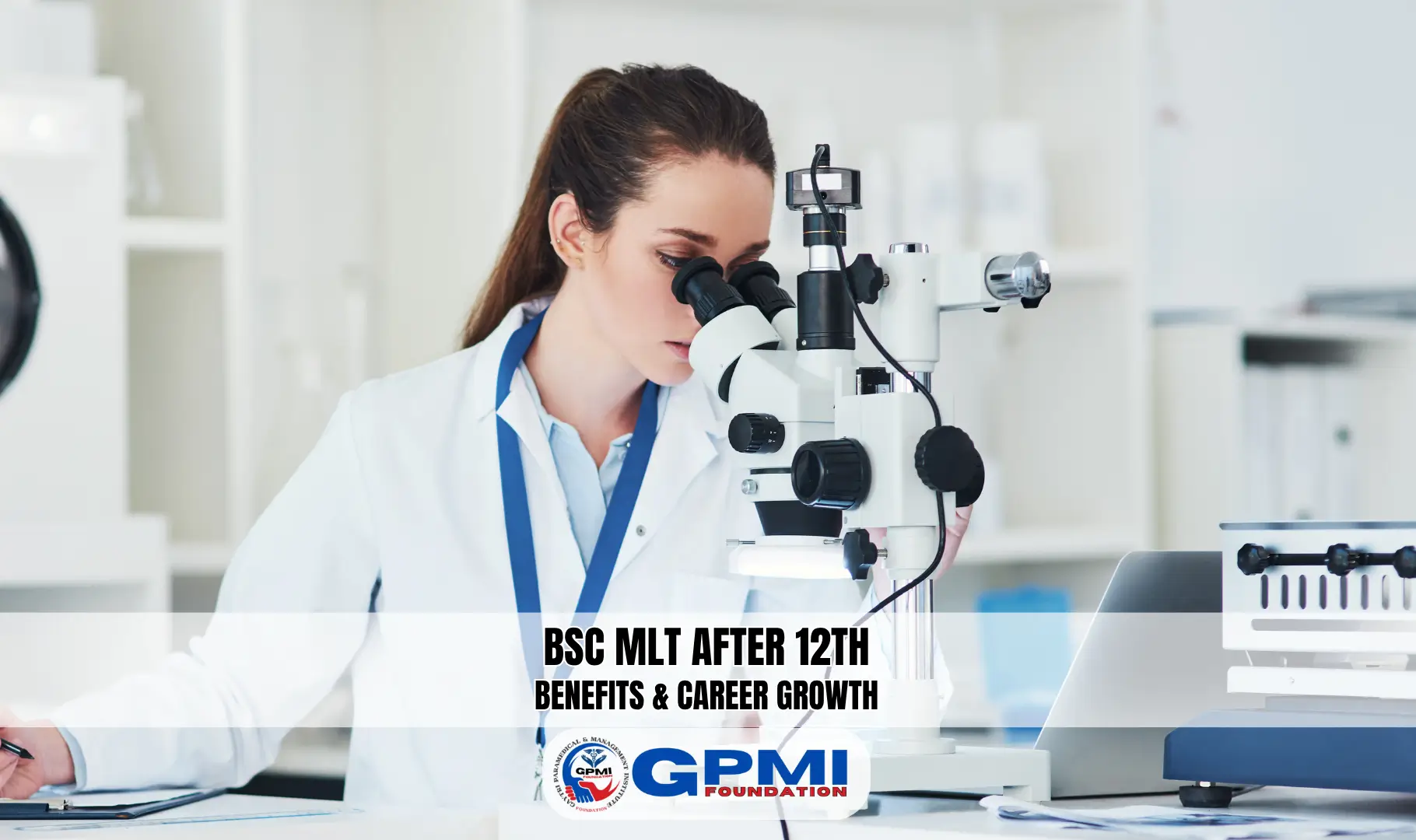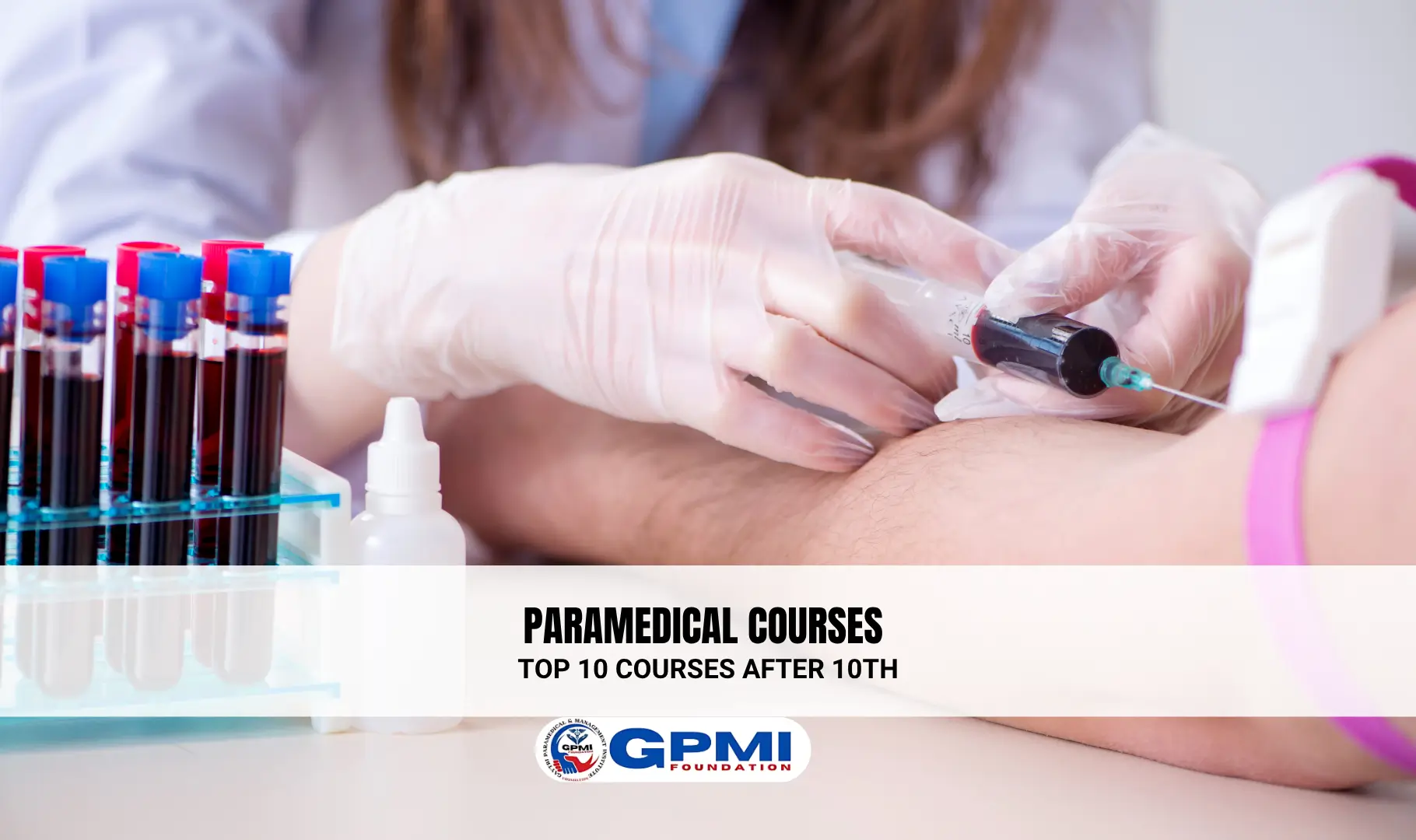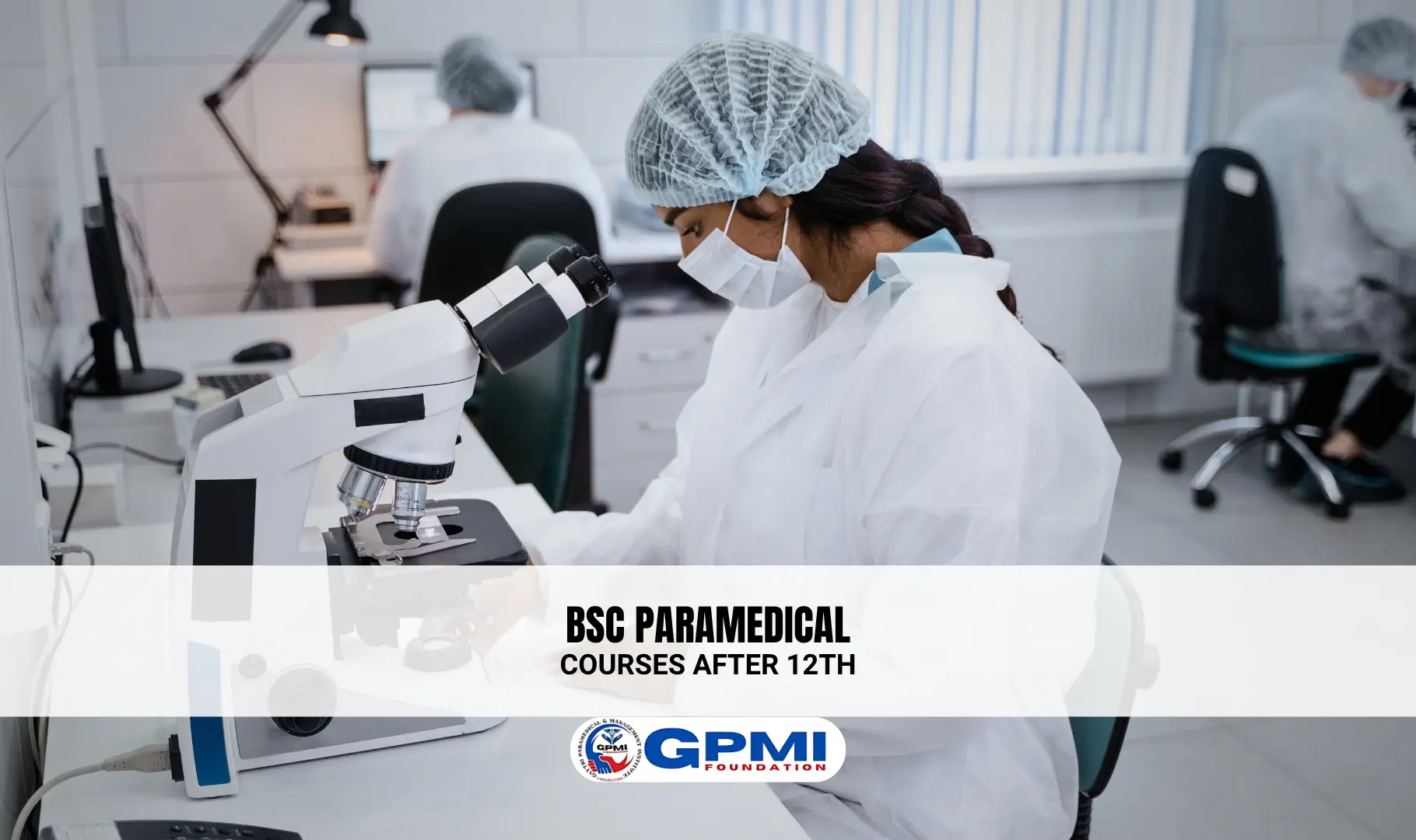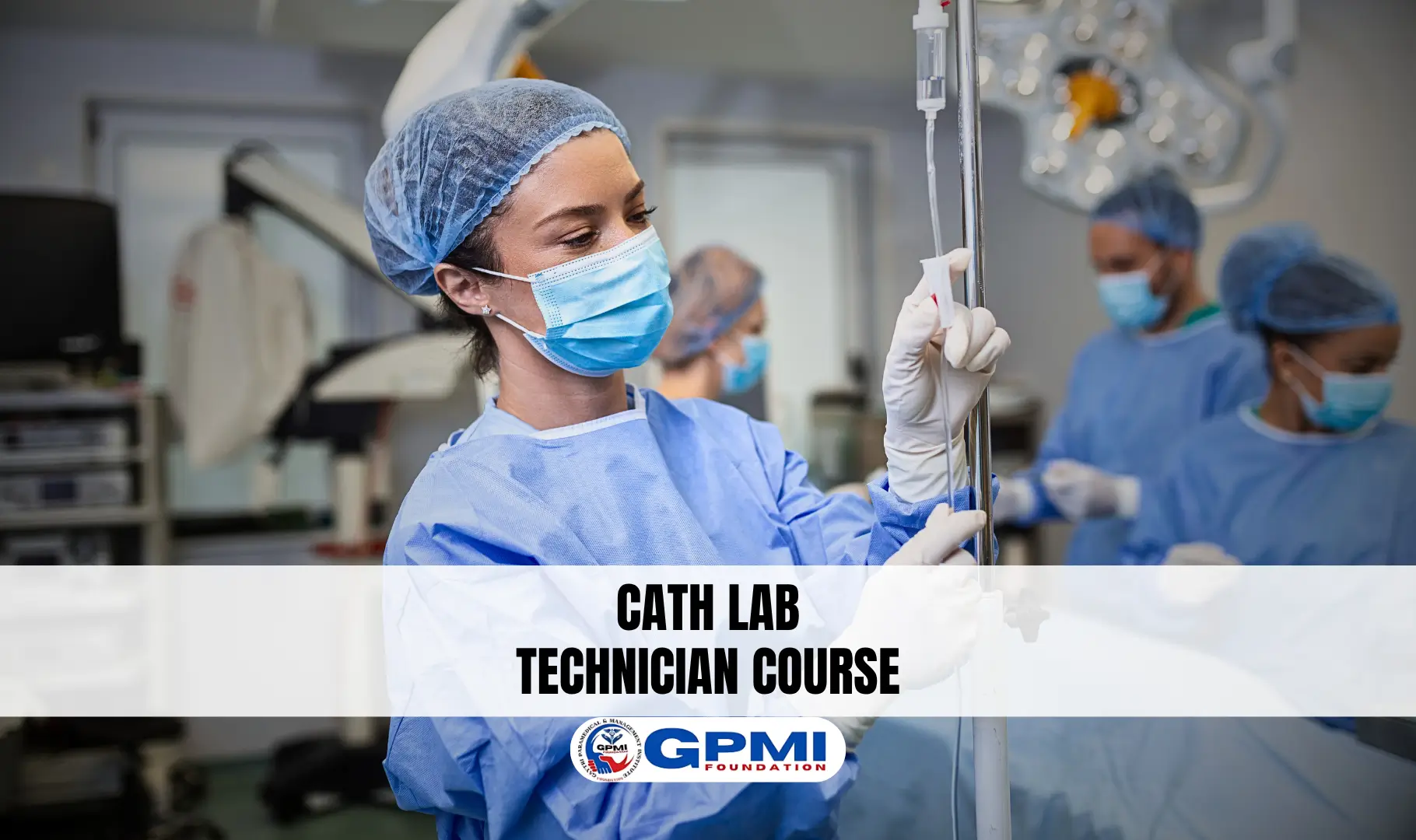Choosing the right course after 12th is a big decision for every student. If you are from a science background and have an interest in the medical field but don’t want to become a doctor or nurse, there’s a great option for you. BSc MLT after 12th is one of the best career paths in the paramedical field.
This course stands for Bachelor of Science in Medical Laboratory Technology. It teaches students how to perform medical tests that help doctors detect and treat diseases. From blood tests to microbiology, students learn hands-on skills in well-equipped labs.
The demand for trained lab technicians is rising fast in hospitals, labs, and diagnostic centers. With this course, you can start a stable and respected career in healthcare. In the next sections, we will explore the top benefits of this course and how it can help you grow professionally in the medical field.
Table of Contents
Before we proceed, let’s explore the details of the B.Sc. MLT course, what it is, its structure, and why it’s a valuable choice after 12th.
What is BSc MLT?
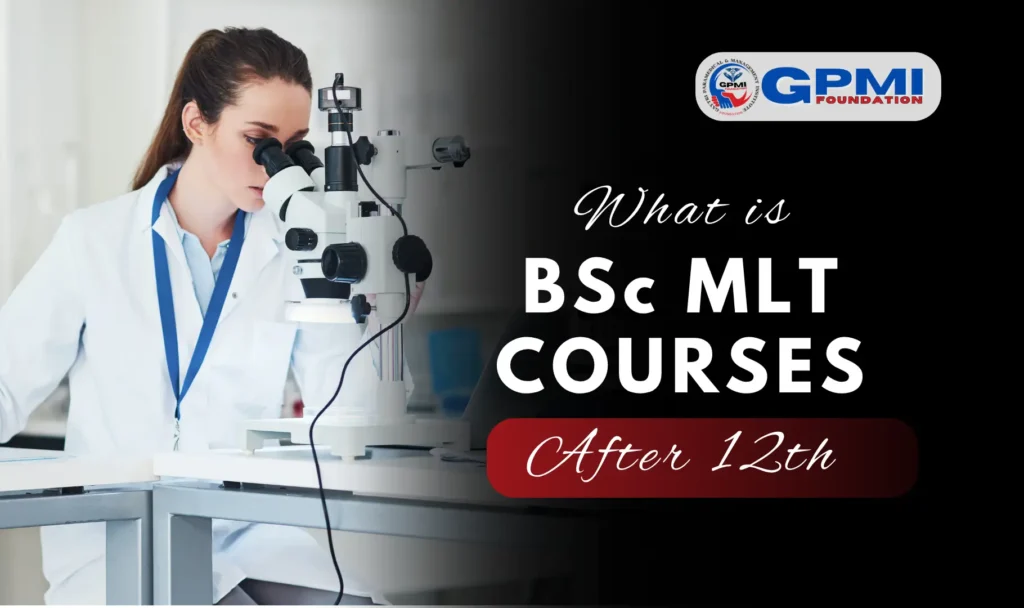
B.Sc. MLT stands for Bachelor of Science in Medical Laboratory Technology. It is a 3-year degree course for students who have completed 12th with science subjects like Physics, Chemistry, and Biology.
This course teaches students how to test blood, urine, and other body samples to help doctors find out what disease a patient may have. Students learn to use lab machines, follow lab safety rules, and handle samples carefully.
The course covers subjects like microbiology, biochemistry, pathology, and blood banking. BSc MLT students are trained to work in hospitals, diagnostic labs, research centers, and blood banks.
Medical lab technologists play a very important role in healthcare because doctors depend on test reports to treat patients. This course is a good choice for students who want a stable, respected job in the medical field without becoming a doctor. With experience, one can also grow into lab management or research roles.
BSc MLT Course Details
Now, let’s explore the BSc MLT course details to help you make an informed decision for your career in the medical field. Understanding the course will guide you toward the right path.
| Particular | Details |
|---|---|
| BSc MLT Full Form | BSc MLT stands for Bachelor of Science in Medical Laboratory Technology. |
| BSc MLT Course Duration | The BSc MLT course duration is 3 years, divided into six semesters. |
| BSc MLT Course Eligibility | 10+2 with science subjects (PCB). Some colleges may also accept students with Mathematics. A minimum of 45-50% marks. |
| BSc MLT Course Fees | ₹60,000 to ₹2,00,000 for the full three years. Some colleges offer scholarships and installment payment options |
| BSc MLT Salary Per Month in Government Hospital | Fresher can earn a monthly salary of around ₹20,000 to ₹35,000. |
| BSc MLT Salary Per Month in Private Hospital | BSc MLT graduates may start with a salary of around ₹15,000 to ₹25,000 per month. |
| BSc MLT Syllabus | Topics covered include human anatomy, clinical biochemistry, microbiology, pathology, hematology, immunology, and lab management. |
| BSc MLT Subjects 1st Year | Human Anatomy, Human Physiology, Biochemistry, General Pathology, Microbiology, Communication Skills, lab safety and basic diagnostic procedures in practical sessions. |
| BSc MLT Subjects 2nd Year | Clinical Biochemistry, Hematology, Immunology and Serology Histopathology and Cytology, Medical Microbiology |
| BSc MLT Subjects 3rd Year | Advanced Diagnostic Techniques, Lab Management and Quality Control, Clinical Pathology, Research Methodology, Internship/Clinical Posting |
BSc MLT Vs B.Voc MLT
Here is a clear and professional comparison table between B.Sc. MLT and B.Voc. MLT courses:
| Feature | B.Sc. MLT | B.Voc. MLT |
|---|---|---|
| Full Form | Bachelor of Science in Medical Lab Technology | Bachelor of Vocation in Medical Lab Technology |
| Course Duration | 3 Years (6 Semesters) | 3 Years (Modular exit options: Diploma/Adv. Diploma/Degree) |
| Eligibility | 12th pass with Science (PCB or PCM) | 12th pass with Science (PCB or PCM) |
| Focus Area | Academic & theoretical knowledge | Skill-based & hands-on training |
| Curriculum | More subject-heavy with focus on diagnostics | More practical with industry-oriented modules |
| Exit Options | Only after 3 years (Degree) | After 1 year (Diploma), 2 years (Advanced Diploma), or 3 years (Degree) |
| Internship/Training | Usually in the final year | Mandatory in all years |
| Career Scope | Hospital labs, diagnostic centers, research labs | Diagnostic labs, private labs, hospitals, home sample collection |
| Job Readiness | May need some extra training after degree | Ready for job from early stages due to skill-based training |
| Higher Studies Options | M.Sc., PGDMLT, MBA, etc. | Same as B.Sc. MLT |
Benefits & Career Growth Of BSc MLT Course

If you are from a science background and interested in the healthcare field, then the BSc MLT (Medical Lab Technology) course can be an excellent option. It not only opens up various job opportunities but also provides a solid foundation for long-term career growth. Let’s explore the key benefits and career scope of this course.
1. Strong Foundation in Medical Diagnostics
The BSc MLT course provides in-depth knowledge and training in various laboratory techniques and medical diagnostics. Students learn to examine blood, urine, stool, tissues, and other body fluids. They also study subjects like biochemistry, pathology, microbiology, and hematology.
These skills are essential for detecting, diagnosing, and preventing diseases. This course prepares students to work confidently in hospital labs, diagnostic centers, and research labs.
2. High Demand in Healthcare Industry
The demand for skilled medical lab technologists is constantly rising. Every hospital, clinic, and diagnostic center needs qualified lab professionals to run tests accurately and deliver timely reports.
As healthcare services expand, the need for lab support also increases. With the rise in lifestyle diseases, medical testing has become more common and essential. A BSc MLT graduate is trained to meet this demand.
3. Wide Range of Job Opportunities
After completing the BSc MLT course, students can find jobs in various sectors such as:
- Government and private hospitals
- Diagnostic labs and pathology labs
- Blood banks and organ banks
- Research laboratories
- Pharmaceutical companies
- Public health laboratories
Job roles may include Medical Lab Technician, Lab Supervisor, Pathology Technician, Clinical Biochemist, and Research Assistant. With experience, students can also take up teaching roles in paramedical colleges.
4. Good Salary and Career Stability
The salary of a BSc MLT graduate depends on the place of employment and experience. A fresher can earn between ₹15,000 to ₹25,000 per month in private hospitals and up to ₹30,000 or more in government sectors. With experience, salaries can rise significantly.
Lab professionals with 5–10 years of experience can also move into senior positions or manage their own diagnostic labs, which brings higher earnings and career stability.
5. Scope for Higher Studies and Specialization
After BSc MLT, students can pursue higher studies such as:
- M.Sc. in Medical Lab Technology
- Post Graduate Diploma in MLT
- MBA in Healthcare or Hospital Management
- Specialized courses in Microbiology, Hematology, or Clinical Research
These qualifications help students grow into specialized roles and improve their chances of promotion and salary hikes.
6. Respectful and Essential Profession
Medical lab technologists play a vital role in patient care. Although they work behind the scenes, doctors rely heavily on lab reports to treat patients correctly. Lab professionals help detect diseases early and save lives. This makes it a respectful and essential profession in the healthcare system.
This course offers a perfect blend of knowledge, skill, and opportunity for students interested in medical science. It is a job-oriented program with high demand, good salary prospects, and multiple career growth paths. If you are looking for a stable and meaningful healthcare career, BSc MLT is a smart and rewarding choice.
BSc Nursing Vs BSc MLT
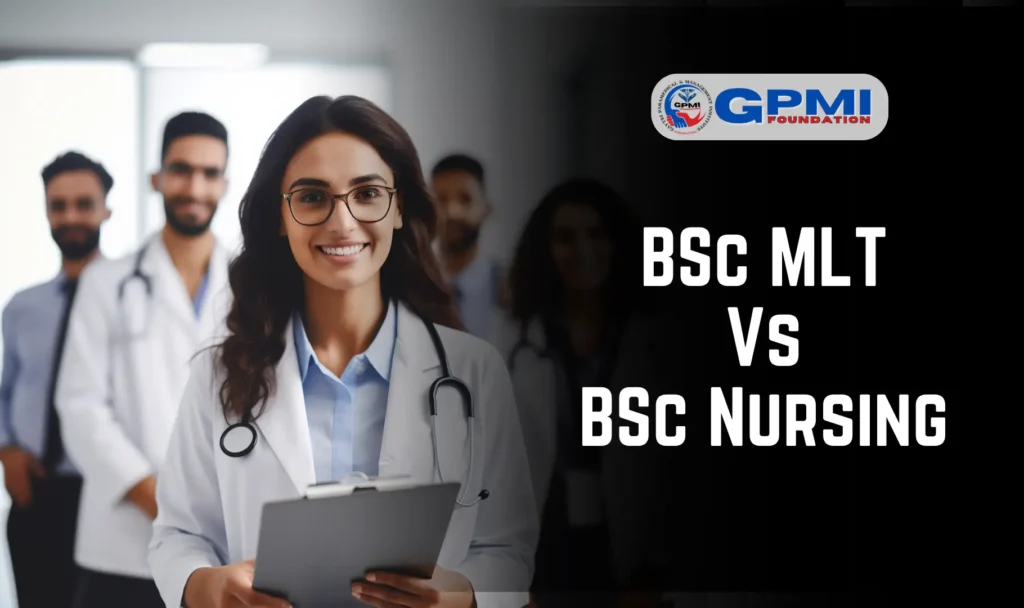
Choosing between BSc Nursing and BSc MLT (Medical Lab Technology) after 12th can be a bit confusing for students interested in the medical field. Both are professional courses with good job opportunities, but they lead to different career paths. Here’s a detailed comparison to help you decide which course is better for you.
1. Nature of Work
- BSc Nursing prepares students to work as nurses in hospitals. Their role includes patient care, medication administration, assisting doctors, and maintaining patient records.
- BSc MLT trains students to become lab technologists. They perform medical tests in labs to help doctors diagnose diseases. Their work is mostly behind the scenes but very important.
2. Work Environment
- Nurses work in patient care areas like wards, ICUs, and emergency rooms. The job can be physically and emotionally demanding.
- Lab technologists usually work in laboratories with limited patient interaction. The work is technical and less physically tiring.
3. Course Content
- BSc Nursing includes subjects like anatomy, physiology, nursing fundamentals, pharmacology, and community health nursing.
- BSc MLT covers pathology, microbiology, biochemistry, hematology, and diagnostic techniques.
4. Career Opportunities
- BSc Nursing graduates can work in hospitals, clinics, military health services, and even go abroad where nurses are in high demand.
- BSc MLT graduates can work in hospitals, diagnostic labs, research labs, blood banks, and pathology centers.
5. Salary and Growth
- Nurses in government hospitals earn around ₹30,000–₹50,000 per month; private hospitals may offer ₹20,000–₹35,000.
- MLT professionals start with ₹15,000–₹30,000 in private labs; experienced professionals can earn much more.
6. Course Fee
- BSc Nursing course fees usually range from ₹7000 to ₹7,50,0000 based on private/government college. for the full 4-year course.
- BSc MLT fees are often more affordable, ranging between ₹60,000 to ₹4,00,000 for the 3-year course, depending on the college.
If you enjoy working with people, caring for patients, and handling stressful situations, BSc Nursing is a better fit. If you prefer working in a technical field, analyzing medical samples, and supporting patient care from behind the scenes, BSc MLT is the right choice. Both careers are valuable and respected in the healthcare system.
B.Sc. MLT vs BSc Radiology
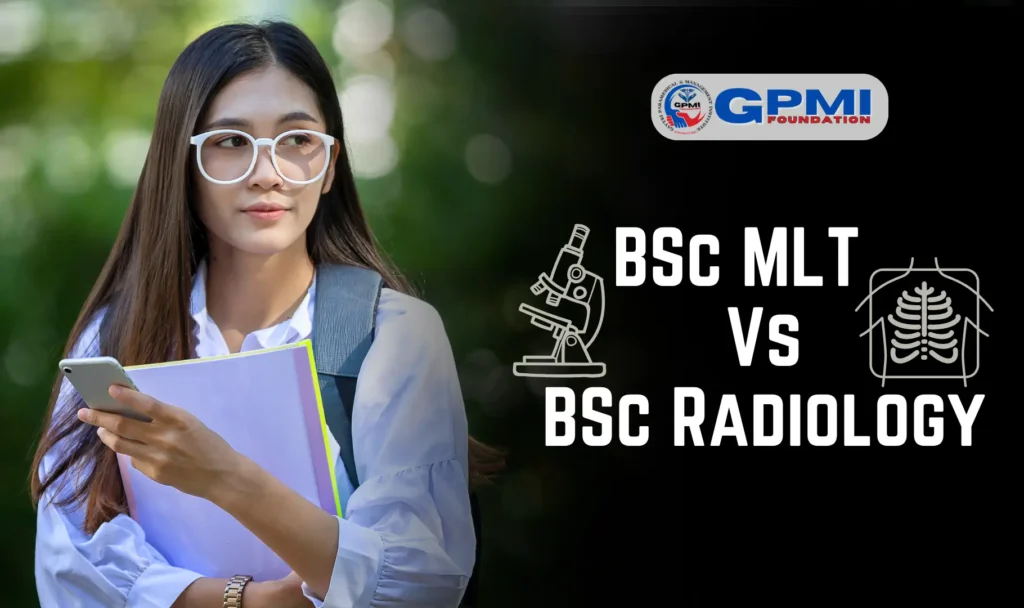
Both BSc MLT (Medical Lab Technology) and BSc Radiology (or BSc in Radiology and Imaging Technology) are excellent career options in the paramedical field, but they offer different skill sets, work environments, and career scopes. Let’s compare them to help you decide which course is better for you based on your interest and career goals.
1. Nature of Work
- BSc MLT graduates work in diagnostic laboratories. They perform tests on blood, urine, tissues, etc., to help in disease diagnosis.
- BSc Radiology professionals work with imaging machines like X-rays, CT scans, MRI, and ultrasound to help doctors see internal body structures.
2. Work Environment
- MLT professionals mostly work indoors in pathology labs, with minimal patient contact.
- Radiology professionals work in diagnostic centers or radiology departments and interact more with patients during scans.
3. Course Duration & Eligibility
- Both courses are 3 years long and require 10+2 with Science (PCB or PCM).
- Some institutes offer internships in the final year for both.
4. Career Opportunities
- BSc MLT: Lab technician, pathology technologist, clinical biochemist, microbiologist, research assistant.
- BSc Radiology: Radiology technician, X-ray technician, MRI/CT scan technologist, medical imaging professional.
5. Salary Comparison
- Freshers in MLT: ₹15,000–₹25,000/month (Private); ₹25,000–₹35,000 (Govt.)
- Freshers in Radiology: ₹20,000–₹30,000/month (Private); ₹30,000–₹45,000 (Govt.)
👉 Radiology may offer slightly higher starting salaries due to the demand for imaging technicians.
6. Job Demand & Future Scope
- Both fields are in high demand due to the rising need for accurate diagnosis.
- Radiology has growing demand due to advanced imaging needs in modern medicine.
- MLT is evergreen as every hospital or lab needs lab tests for diagnosis and treatment.
7. Course Fees (Approximate)
- BSc MLT: ₹60,000 – ₹2,00,000 (3 years)
- BSc Radiology: ₹80,000 – ₹2,50,000 (3 years)
Choose BSc MLT if you like working with microscopes, chemicals, and test reports, prefer less patient interaction, and want a consistent lab-based role. Choose BSc Radiology if you are interested in imaging technologies, don’t mind patient interaction, want a higher-paying, equipment-based role. Both are respected fields in healthcare. The better course depends on your interest, comfort with patients, and career vision.
After BSc MLT Which Course is Better?
After completing a BSc in Medical Lab Technology (MLT), students have several options to advance their careers. The best course depends on your interests and goals. If you want to specialize in laboratory science, you can go for M.Sc. in MLT, Microbiology, or Clinical Biochemistry.
These courses deepen your knowledge and open doors to senior lab roles or research jobs. If you’re interested in healthcare management, MBA in Hospital or Healthcare Management is a great choice.
It helps you move into administrative or managerial positions in hospitals or labs. Students who want to teach or work in academics can pursue B.Ed. or M.Sc. followed by NET exams.
For those looking to work abroad, international certifications like ASCP (USA) or HCPC (UK) are valuable. In short, pick a course that matches your passion—technical, research, teaching, or management—to build a successful career after BSc MLT.
Conclusion
The BSc MLT course is a powerful gateway into the healthcare sector for students who have completed 12th with science. It offers a solid academic foundation, practical lab skills, and a wide range of career opportunities in hospitals, diagnostic labs, and research centers.
With the growing need for accurate and timely diagnosis, the demand for skilled lab technologists is increasing across India and abroad. The course is not only job-oriented but also provides stability, respect, and room for professional growth.
After completing BSc MLT, students can choose from various advanced courses like M.Sc. MLT, MBA in Healthcare, or international certifications to further enhance their career prospects.
Whether you want to continue in technical roles, switch to teaching, or grow into hospital management, BSc MLT opens many doors. If you’re looking for a meaningful and future-proof medical career, BSc MLT is a smart and rewarding choice.
FAQs
Is BSc MLT A Degree?
Yes, BSc MLT is a degree course. It is a 3-year undergraduate degree program offered by many universities and colleges in India.
Is B.Sc. MLT good for girls?
Yes, B.Sc. MLT is a good option for girls. It offers a stable career, respectful work environment, and growing opportunities in labs, hospitals, and diagnostic centers.
Does BSc. MLT Require NEET?
No, BSc MLT does not require NEET. Most colleges offer direct admission or conduct their own entrance exams. NEET is only required for courses like MBBS, BDS, and a few others—not for paramedical degree programs like BSc MLT.
Who is eligible for BSc MLT?
Students who have passed 10+2 with Science stream (Physics, Chemistry, Biology) from a recognized board are eligible for BSc MLT.


